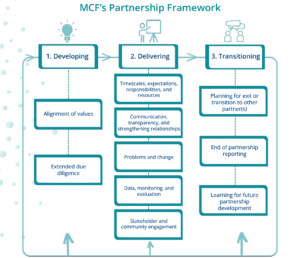Impact & Evaluation
The MCF Partnership Framework Toolkit
The MCF Partnership Framework Toolkit has been developed by the Impact and Evaluation team to serve as a comprehensive guide for identifying, establishing, nurturing, and transitioning partnerships on behalf of the MCF. Its primary goal is to cultivate highly successful partnerships.

The Toolkit presents a collection of practical questions and topics to be considered, which offer flexible guidelines instead of rigid mandates. The Toolkit outlines a framework that visualises building partnerships as a process, using three principle headings: Developing; Delivering; and Transitioning.
Developing (stage one) is the process of identifying and establishing partnerships. This stage is crucial as it sets the stage for establishing robust foundations that are essential for the partnership’s sustainability and ultimate success. In this stage it is important to have:
- Alignment of values: values should work in harmony so that the partnership can serve to uphold the strategic vision of the MCF in delivery of its goals, as well as the goals of partner organisations. When identifying strategic partners the first question that should be asked is whether the organisations can work with the values outlined by the MCF in support of the broader MCF vision.
- Extended due diligence: the MCF has a procurement policy and process that is fit for purpose. The purpose of an extended due diligence is to offer additional questions alongside the tender evaluation matrix found in our financial procedures.
Delivering (stage two) is the process of strengthening and maintaining partnerships. In this stage there should be:
- Timescales, expectations, responsibilities, and resources, which are the foundations to good communication and partnership working.
- Communication, transparency and strengthening relationships: having clear channels of communication strengthens successful partnerships, and trust is a key element in partnership building, often developing organically over time.
- Problems and change: establishing an open culture of shared accountability, especially one that reflects upon and learns from mistakes, will build open, honest and transparent working cultures; creating safe spaces to explore problems is important.
- Data, monitoring and evaluation: these are key to the MCF’s 2023-2030 strategic plan. Effective monitoring and evaluation requires agreement and clarity on how and when data will be collected, measured, used and shared. This should also be included in the communication plan.
Transitioning (stage three) concludes partnership working, transition and review. This includes:
- Planning for exit or transition: partnerships that are finite or time limited will require effective project closure. Moving on from partnerships with goodwill and the potential for future partnership working is important.
- End of partnership reporting: final reporting is an opportunity to share the culmination and impact the partnership has had in terms of achieving its goals. These reports help to inform key stakeholders, including the Freemasonry community. This level of reporting is less relevant for service delivery partnerships, although there should be some form of report stored for reference and to inform potential future partnerships.
- Learning for future partnership development: learning what worked well and what did not are important internal reflections at the end of a partnership. Having a reflective document such as a learning log can help the process of reflection. The general culture should be one that embraces failures as opportunities for learning.
DOWNLOAD THE FRAMEWORK DOCUMENT
For further information on the MCF Partnership Framework Toolkit or any Impact & Evaluation-related queries, please contact our Impact & Evaluation Manager, Jo Haffenden at jhaffenden@mcf.org.uk.





